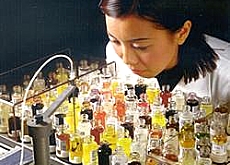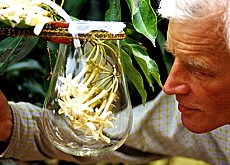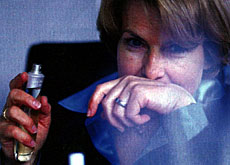In search of the trend flavours of the future

Liquid instant noodles, a smoke shot, tomato texture and a chocolate mousse "bonbon" are just a few of the trendy flavours that may be the hits of the future.
Givaudan, the Geneva-based world leader in flavours and fragrances featured them all at a presentation on trend identification in flavours at one of its research centres near Zurich.
While some people might scoff at the idea of making your own noodles from a liquid that comes out of what looks like a small plastic bottle of hotel shower gel, the proof is in the pudding… or rather the clear Asian soup you pour it into.
It’s an experience to make your own creations, designs or just writing your name with the liquid as it forms the solid noodles, and that is precisely what many chefs around the world are trying to do – make food something to remember.
“Today eating food is not just to fill up your stomach, you want to actually experience the food,” Givaudan executive chef Daniel Nachbaur told swissinfo after preparing some of the dishes.
“It’s for those who want to be a little bit trendy, who are growing with the times, who would like to experience something new and who are open-minded.”
Nachbaur is one of the Givaudan chefs who have been drawing ideas from seven world-renowned cooks from each region of the world in a company programme called Chefs Council.
Inspiration
“We work together with top chefs and get inspiration from them. All of them are really cracks in the field they are working in,” he said.
They share individual styles, signature dishes and recipes with the aim of coming up with innovative flavour themes for the future.
But why does Givaudan need to identify trends in flavours?
“We need to identify trends mostly to stay ahead of the competition, to help our customers develop new products for the future, which both appeal to consumers and are successful for them in their market places,” Christiane Lippert, the company’s category manager for savoury flavours for Europe, Africa and the Middle East, told swissinfo.
Lippert explained that the company has developed its own programme called FlavourVision, which distils a whole range of knowledge into an understanding of “what’s next”.
One part of the programme, called TrendTrek goes out quite simply in search of trends in society.
Capturing ideas
“Both marketing and research people go to various cities around the world to capture ideas of what’s hot, what’s happening, what are the urban trendy consumers doing, what are they eating, what are they drinking…and getting ideas from that,” Lippert explained.
Another source of inspiration comes from TasteTrek in which there are two main aims.
“We explore regions rich in biodiversity to research new molecules and ingredients to create new flavours, such as unusual fruit or flora varieties.”
Givaudan researchers have carried out such exploration in Gabon and Madagascar.
“The second [aim] is capturing aromas to replicate them in aroma form from regions very rich in culinary heritage. That would include the Asian regions and Latin American regions, which have very interesting tastes and recipes,” Lippert said.
Gimmicks?
The end result might seem a little far-fetched and involve gimmicks or novelties that will sooner or later wear off. Lippert disagrees.
“I can understand the idea that someone would think that but actually this is the world we live in. We create trends in what we do.
“What we collect are examples from society, examples from nature, examples from elite chefs… and all these go towards inspiring what becomes the next generation of products and flavours on the markets, so it’s not what we see as a gimmick,” she said.
And executive chef Nachbaur puts it another way: “If we would continue to cook in the same way as we’ve done for a hundred years, we would not make any progress.”
swissinfo, Robert Brookes in Kemptthal
Léon Givaudan founded the company in 1898, but it can trace roots back to the French Revolution.
The Roche pharmaceutical company of Basel acquired Givaudan in 1963.
Givaudan was spun off from Roche in June 2000 and is an independent Swiss company.
In 2002 the company acquired Nestlé’s flavour business FIS.
It announced a deal valued at SFr2.8 billion ($2.31 billion) with ICI for the acquisition of Quest International in November 2006.

In compliance with the JTI standards
More: SWI swissinfo.ch certified by the Journalism Trust Initiative



You can find an overview of ongoing debates with our journalists here. Please join us!
If you want to start a conversation about a topic raised in this article or want to report factual errors, email us at english@swissinfo.ch.